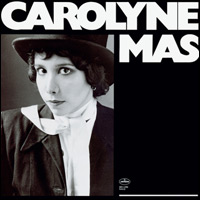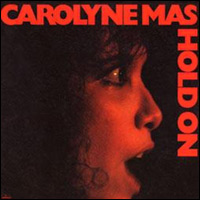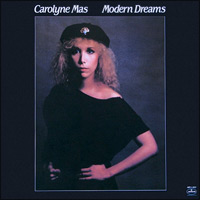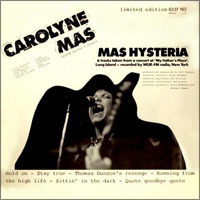|
Music Reviews
Alternative
Blues
Books
Christmas
Classic Rock
Country
Jazz
Lounge
Oldies
Power Pop
Punk & New Wave
Reggae
Rhythm & Blues
Seventies
Texas
Special Features
Randy's Rodeo
Sex Pistols
Motown
Halloween
Valentine's Day
Information
About Me
Feedback
Links
User's Guide
Support Me
Amazon
iTunes
Sheet Music Plus
|
Sock it to me, Santa! Visit my other website, www.hipchristmas.com Visit my other website, www.hipchristmas.com
 In a 1980 article in Time Magazine called "Chick Singers Need Not Apply," critic Jay Cocks wrote about four promising young female rockers - Pat Benatar, Ellen Shipley, Ellen Foley, and Carolyne Mas - who were struggling to make it in a world still dominated by men. "These four have produced records," said Cocks, "that stand with the most promising work of the year from any gender - male, female, or convertible." Back then, women who rocked were considered novelty acts, at best. Instead, women were encouraged to be pop singers or, at most, singer/songwriters like Carole King or Joni Mitchell. This may be hard for young readers to fathom because, by the 21st century, women in rock had plenty of role models - from Gwen Stefani to Polly Jean Harvey to Kathleen Hanna and beyond. But in 1980, Carolyne Mas was driven to protest, "I'm not a chick singer." In a 1980 article in Time Magazine called "Chick Singers Need Not Apply," critic Jay Cocks wrote about four promising young female rockers - Pat Benatar, Ellen Shipley, Ellen Foley, and Carolyne Mas - who were struggling to make it in a world still dominated by men. "These four have produced records," said Cocks, "that stand with the most promising work of the year from any gender - male, female, or convertible." Back then, women who rocked were considered novelty acts, at best. Instead, women were encouraged to be pop singers or, at most, singer/songwriters like Carole King or Joni Mitchell. This may be hard for young readers to fathom because, by the 21st century, women in rock had plenty of role models - from Gwen Stefani to Polly Jean Harvey to Kathleen Hanna and beyond. But in 1980, Carolyne Mas was driven to protest, "I'm not a chick singer."
From those four young singers, Pat Benatar, of course, became the one singular sensation. She sold a gobs of records while serving as the consensus sexual fantasy of millions of mullet-headed teenage boys. The other three didn't fare so well. Each made three well-received major label records, none of which sold very much. Ellen Foley, at least, was already reasonably famous as Meatloaf's backseat tormentor in "Paradise By The Dashboard Light" (1977), and she went on to play the hot public defender in the TV show "Night Court" for one season before Markie Post took over the role in 1985. Ellen Shipley, meanwhile, retreated to songwriting, but she eventually landed a #1 hit with Belinda Carlisle's "Heaven Is A Place On Earth" in 1987.
Carolyne Mas, however, never achieved a whole lot else - though she became a cult figure in Germany and stuck it out in the music business for more than 30 years, sporadically releasing albums while raising a family and pursuing other interests (including animal protection and painting). Along the way, she went broke at least once, nearly got stabbed to death, got kicked out of her home, and was routinely screwed over by managers, record companies, publishers, bootleggers, the legal system, and, arguably, life in general. Years later, Mas would opine, "I believe that I would have been a happier person if I had never made a record."
 All that's a shame, obviously - but doubly so because Carolyne Mas was the most talented of the four singers featured in that Time article. I'm pretty fond of Ellen Foley, too, but Carolyne Mas had them all beat in terms of pure creativity, rock 'n' roll bona fides, and, especially, the awesome power of her voice. Her Mercury debut, Carolyne Mas (1979), is simply one of the most consistently great albums in my overstuffed collection - chock full of memorable songs, inventive arrangements, and jaw-dropping vocal performances. Take, for instance, "Snow," an impressively overwrought ballad. Mas takes her time developing the theme but, by the finale she is swooping and soaring with the control of an opera singer (which she once was) and the ferocity of a born rocker. All that's a shame, obviously - but doubly so because Carolyne Mas was the most talented of the four singers featured in that Time article. I'm pretty fond of Ellen Foley, too, but Carolyne Mas had them all beat in terms of pure creativity, rock 'n' roll bona fides, and, especially, the awesome power of her voice. Her Mercury debut, Carolyne Mas (1979), is simply one of the most consistently great albums in my overstuffed collection - chock full of memorable songs, inventive arrangements, and jaw-dropping vocal performances. Take, for instance, "Snow," an impressively overwrought ballad. Mas takes her time developing the theme but, by the finale she is swooping and soaring with the control of an opera singer (which she once was) and the ferocity of a born rocker.
But, it gets even better. Like Karla DeVito - another New York-based, opera-trained rock singer - Carolyne Mas had a taste for dramatic pop music more suited to the stages of Broadway than the dank nightclubs of the Bowery. Some of the most memorable moments on Carolyne Mas (including "Snow," "Call Me," and "Sittin' In The Dark") have that quality, and Mas sings the hell out of them. But, the focal point of Carolyne Mas has to be the lead track, "Stillsane." It's a tightly-wound, radio-friendly rocker that could serve as a case study for what made Carolyne Mas so appealing, and it would prove to be her only hit single - albeit a minor one (#71). These were the halcyon days of punk rock, and like several other tracks on the album (including "Sadie Says," "Quote Goodbye Quote," and "Do You Believe I Love You"), "Stillsane" burns with a distinctly modern fire while retaining the big heart and broad gestures of classic rock.
Carolyne Mas, you see, emerged from the same regional culture (centered in New York, but encompassing Boston, New Jersey, and other regional hotspots) that spawned forward-thinking musicians like Willie Nile, Steve Forbert, the Iron City Houserockers, Garland Jeffreys, the Roches, and the aforementioned Ellen Foley and Karla DeVito. Building on the foundation of 60's icons like Bob Dylan, Mitch Ryder, and Janis Joplin, this particular class of rockers combined the theatrics of local hero Bruce Springsteen with the intellect and urgency of Elvis Costello to create a distinctly new form of American music. For a while, it seemed like it might represent a sort-of mainstream alternative to punk and new wave (later examples would include the Del Fuegos, Hooters, and BoDeans), but, like Carolyne Mas, none of those artists ever rose much above cult status.
 Anyway, despite some fairly good buzz and glowing reviews, Carolyne Mas was not a huge success, and Mas began to squabble with her record label, Mercury. Work proceeded on her sophomore album, however, and she adjusted her attack in a way that should have spelled success. It was Carolyne Mas' incendiary stage performances, you see, that built that buzz and got her signed to Mercury. And while I never got to see Carolyne Mas in person, her concerts are legendary among her small, devoted base of fans. Her second album, Hold On (1980), is informed by that fact in a couple of ways. Most obviously, the cover art features several striking photos of Mas in action - sweaty and focused, slinging her Telecaster - a stark contrast to the coy, demure portraits on her debut. More pervasively, though, Hold On sounds like a live rock 'n' roll album, minus the audience. Anyway, despite some fairly good buzz and glowing reviews, Carolyne Mas was not a huge success, and Mas began to squabble with her record label, Mercury. Work proceeded on her sophomore album, however, and she adjusted her attack in a way that should have spelled success. It was Carolyne Mas' incendiary stage performances, you see, that built that buzz and got her signed to Mercury. And while I never got to see Carolyne Mas in person, her concerts are legendary among her small, devoted base of fans. Her second album, Hold On (1980), is informed by that fact in a couple of ways. Most obviously, the cover art features several striking photos of Mas in action - sweaty and focused, slinging her Telecaster - a stark contrast to the coy, demure portraits on her debut. More pervasively, though, Hold On sounds like a live rock 'n' roll album, minus the audience.
Whereas Carolyne Mas was characterized by a made-in-the-studio, high-gloss finish, Hold On had a fly-on-the-wall ambience - less like Abbey Road, and more like Exile On Main Street. The quality of the songwriting wasn't quite as impressive, but Mas and her band (anchored by guitarist David Landau) sound like a real performing unit - which they had literally become over the past couple of years. Highlights of the album include the volatile title track, the Springsteen-esque "Stay True," the slow-burning "Go Ahead And Cry Now," and the punky single "He's So Cool." She also tosses off a smokin' version of Steve Forbert's "You Cannot Win If You Don't Play" that roundly beats the original; Mas and Forbert had once been lovers, she later confessed, so perhaps she stole his mojo....
Even with another round of good reviews, Hold On, as you may have guessed, was even more of a commercial disappointment than Carolyne Mas. According to Mas, Mercury basically forgot all about her, and "He's So Cool" sank like a stone at radio. Nevertheless, she and her band kept tirelessly touring the college circuit and blowing audiences away. Someone who saw them at Wake Forest University wrote, "There couldn't have been 50 people in the crowd, but Mas and her band treated us like we were a packed house at Madison Square Garden. The energy was phenomenal, and I remember wondering for months when I would finally hear her on the radio. I felt certain that I'd been there for the early days of something big." After too many shows like that, however, the band would discover that their album was nowhere to be found in the racks of local record shops. Things looked hopeless when, quite unexpectedly, Carolyne Mas scored the biggest and most enduring hit of her career - in Germany.
 In early 1981, Phonogram, the German arm of Mercury Records, released a live, six-song EP called Mas Hysteria recorded live in New York the previous year for the King Biscuit Flower Hour radio show. Mas Hysteria was designed to look like a bootleg and released, in fact, merely to promote Mas' appearance on an upcoming TV show in Germany called Rockpalast. Unexpectedly, it became a minor sensation all by itself, particularly the 12-minute version of "Sittin' In The Dark" which became the German equivalent of marathon rock anthems like "Stairway to Heaven" and "Free Bird" - radio perennials that give disc jockeys enough time to smoke a joint or go to the can. According to Mas, however, Mas Hysteria never earned her a penny - despite eventually selling 250,000 copies. (She's also big in Italy, by the way.) In early 1981, Phonogram, the German arm of Mercury Records, released a live, six-song EP called Mas Hysteria recorded live in New York the previous year for the King Biscuit Flower Hour radio show. Mas Hysteria was designed to look like a bootleg and released, in fact, merely to promote Mas' appearance on an upcoming TV show in Germany called Rockpalast. Unexpectedly, it became a minor sensation all by itself, particularly the 12-minute version of "Sittin' In The Dark" which became the German equivalent of marathon rock anthems like "Stairway to Heaven" and "Free Bird" - radio perennials that give disc jockeys enough time to smoke a joint or go to the can. According to Mas, however, Mas Hysteria never earned her a penny - despite eventually selling 250,000 copies. (She's also big in Italy, by the way.)
Perhaps because of the Mas Hysteria phenomenon, Carolyne got to make a third record for Mercury despite her dysfunctional relationship with the label. The Who's engineer Jon Astley came on board to help produce, but most-valuable-player David Landau (who also helped write many of Mas' best songs) was not around, and the end result was softer, less focused, and more tentative than anything she had yet produced - she even dabbles in disco ("Love Like Stone"). Certainly, Modern Dreams (1981) has its moments - including the strident single "It's Important," the jangly ballad "Easy Love," and Mas' ringing version of Moon Martin's "Signal For Help" - but the rest of the album is plagued by lackluster songwriting and weighed down by too many synthesizers. Inarguably, Modern Dreams suffers in comparison to Carolyne Mas and Hold On. But, my opinion notwithstanding, the album garnered the usual plaudits from the press. Regardless, it caused nary a ripple in the marketplace.
Subsequently dropped by Mercury and deeply in debt, Carolyne Mas was all but forced from the music business for a few years, and that's where my story comes to an end. Those three Mercury studio albums are all I've ever owned - purchased on vinyl all those years ago and cherished ever since. Carolyne's story, however, keeps going, and though the litany of travails and missed opportunities continues, she just won't quit - still sane after all these years, you might say.
Over the decades, Mas has recorded a number of additional albums including Action Pact (1989) with noted roots rockers the Skeletons, Live! (1992), Reason Street (1993), Brand New World (2005), and Across The River (2013), all released on small labels, some only in Europe. I recommend her thorough, informative, idiosyncratically organized website, www.carolynemas.com, as a good way to learn more about her and acquaint yourself with her music.
Postscript. Around the time I wrote this article, you could download the entirety of Carolyne Mas' Mercury studio recordings as The Vinyl Collection (2012) - mastered, indeed, from clean vinyl copies - as well as an uncut, 70-minute version of Mas Hysteria. These disappeared from her website but, amazingly, her three Mercury studio albums were finally formally reissued in the digital realm - first for download and streaming in 2018, and then on CD in 2019 by an indie label called Renaissance Records. The reissues were clearly produced on a limited budget, but a lot of love went into them, including personal notes from Carolyne herself, unpublished photos, and bonus tracks. The cover art, sadly, is quite badly reproduced; I suspect that Renaissance was working from old LP jackets, and their apparently amateur art department simply darkened all the photos to conceal their defects. A minor flaw, all things considered. But, of course, the bottom line is the sound quality. The fidelity is generally solid with good depth and clarity, and it's a discernible improvement over The Vinyl Collection, but it's still taken from vinyl - pops and clicks included. There's no point in speculating, really - either Mas bootlegged herself or Mercury couldn't or wouldn't provide the masters. In the end, I'm just happy that her music is out there again, warts and all. [top of page]
 Selected Carolyne Mas Albums Selected Carolyne Mas Albums
[top of page]
 Essential Carolyne Mas Songs Essential Carolyne Mas Songs
- All For You (1980)
- Do You Believe I Love You (1979)
- Easy Love (1981)
- Go Ahead and Cry Now (1980)
- He's So Cool (1980)
- Hold On (1980)
- It's Important (1981)
- It's No Secret (1979)
- Quote Goodbye Quote (1979)
- Sadie Says (1979)
- Signal For Help (1981)
- Sittin' In The Dark (1979)
- Snow (1979)
- Stay True (1980)
- Stillsane (1979)
- You Cannot Win If You Do Not Play (1980)
[top of page]
 Carolyne Mas On The Web Carolyne Mas On The Web
[top of page]
 Feedback Feedback
Your witty comments, impertinent questions, helpful suggestions, and angry denials
are altogether encouraged. Submit feedback via email;
submissions will be edited and posted at my discretion.
|
|